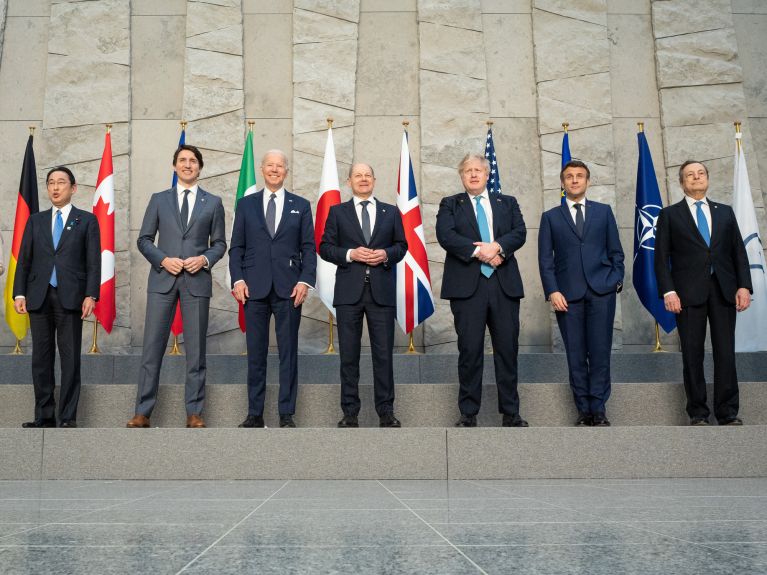“Progress towards an equitable world”
Germany’s G7 presidency is being influenced by the Ukraine war. We look at the response of the G7 states and the goals of the German government.

At the start of 2022, Germany assumed the presidency of the G7 for one year and set itself a clear goal in its programme: “Progress for an equitable world”. Not even two months later, on 24 February, the Russian war of aggression began against Ukraine, and ever since has also influenced the German G7 presidency. At the same time, German Chancellor Olaf Scholz has warned that the war must not result in “us as the G7 neglecting our responsibility towards global challenges such as the climate crisis or the pandemic – on the contrary, many of the objectives we set ourselves at the beginning of the year are becoming even more urgent in view of the changed global situation.”
Which states make up the G7?
Besides Germany, the Group of Seven includes France, Italy, the United Kingdom, Japan, Canada and the USA. Rather than forming an official organisation, however, the seven leading industrial nations and democracies constitute an informal forum to which the European Union also belongs. Because of this organisational form, whichever country holds the G7 presidency has a special role to play – in this case the German government. The German government is also hosting the G7 leaders’ summit, which will be taking place at Schloss Elmau in Bavaria from 26 to 28 June.
How are the G7 countries responding to the war against Ukraine?
The seven states are united in their support for Ukraine and condemn the war of aggression initiated by Russia’s President Vladimir Putin. For example, the G7 leaders issued the following state on the 77th anniversary of the end of the Second World War on 8 May: “We reiterate our condemnation of Russia’s unprovoked, unjustifiable and illegal military aggression against Ukraine and the indiscriminate attacks against civilians and civilian infrastructure, which has resulted in terrible humanitarian catastrophe in the heart of Europe.” Immediately after the invasion of Russian troops, the G7 states responded by approving an unprecedented sanctions package against Russia and by pledging billions in financial aid to Ukraine. In addition, they are providing military support to the Ukrainian armed forces, and even Germany is supplying weapons.
What is Germany focusing on particularly during its G7 presidency?
The Federal Government has set itself five major goals: strong alliances for a sustainable planet; setting the course for economic stability and transformation; enhanced preparedness for healthy lives; sustainable investments in a better future, and stronger together. Among other things, this means in concrete terms that Germany plans to initiate the establishment of an open, cooperative “Climate Club“. In addition, the German government wants to advance international cooperation for sustainable development in the spirit of the 2030 Agenda of the United Nations. Germany has also committed itself within the G7 framework to promoting gender equality worldwide.
Germany’s Federal Government is also seeking direct contact with civil society, with forums such as Business7, Women7 and Youth7 having been set up to this end during the German G7 presidency.
Up-to-date information about Germany’s G7 presidency
You would like to receive regular information about Germany? Subscribe here:


